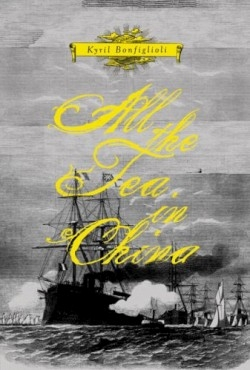
All the Tea in China
Those far-sighted enough to have snapped up Overlook Press’s 2005 re-issue of the *Mortdecai Trilogy—*Kyril Bonfiglioli’s powerfully comedic, high-octane send-ups of the bon-viveur-cum-sleuth detective story—may have hoped that this fine-tuned soufflé chef of an author would turn out a steak-and-the-works banquet of a book. He did.
All the Tea in China, set in the 1840s, is a rollicking, picaresque travelogue account of the adventures of Karli Van Cleef, an ever-optimistic Dutch-born Jewish scoundrel in his twenties. The story is fast-forward. Young Karli leaves Holland in a hurry for the all-too-usual reason. “Adoption” on arrival by an exuberantly generous tea-merchant right out of the world of Robert Surtees, the Victorian serial comic novelist, enables Karli to open a porcelain shop. Selling his mother’s gift of Delftware is only a beginning; ambition soars, the lucrative opium trade beckons, and Karli becomes an on-board partner on an opium-buying voyage that takes him to India and China, but back—after the required pirate attacks, typhoons, mutiny, and assorted derring-do—overland via Africa.
Bonfiglioli’s great gift is the ability to re-energize the form. He canters past such still-rewarding worthies as Richard Dana and Captain Marryat, and his cast of sharply drawn characters makes those of Robert Louis Stevenson seem like Sunday School lads. And what a range he has: a foppish porcelain-purchasing peer (“I’ve skimmed the cream a bit, what?”), a murderous captain (“hold your tongues, you dogs”), a young aristocrat serving as third mate (“I am a ruined man…the Great Pox”), an African cook who could teach César Ritz a thing or two. And, of course, there’s a woman at every turn who is God’s gift, not to mankind, but to Karli.
The prose is as colorful as the narrative: “The East India Docks presented a scene of indescribable confusion; it was as though the Tower of Babel had collapsed alongside the Slough of Despond” may not rival Herman Melville on New York Harbor, but concisely evokes the cacophony-amid-squalor that characterized London’s Victorian docklands. India’s commercial heart receives an unexpected put-down: “Calcutta was a disappointment,…temples adorned with carvings…explicit in their indecency…where were the scented arbors,” the jeweled birds?
Despite playful hints of parody and pastiche, all Bonfiglioli’s writing is grounded in solid history, often arcane or esoteric but always apposite and rewarding. The recognition of truly fine porcelains; sail-setting aboard ship (“performed with what seemed random precision”) and the crew’s health, diseases, and medications; weaponry; the enjoyment of fine food; the texture of a tropical night, the finer points of opium smoking; mundane noises and smells—all receive informed appreciation. Bonfiglioli’s one-offs range from the politically incorrect, “All one can ask for in a woman is that she has a soft voice, a firm body and a pretty, empty head,” through the prophetic, “The Irish have a wonderful command of language, wonderful. If ever they learn to read or write there will, one day, be a great literature from them, mark my words,” to the insightful, “To the English bloody war is a game but a game is bloody war,” and the well-observed, “Purged and happy, like a Papist from the confessional-box.”
Bonfiglioli’s background was a useful springboard for his mid-life decision to become a one-of-kind author: “Of Italo-Slovene descent, son of an antiquarian bookseller,” he led a fast-moving, erratically financed life, with Army service in Africa, some teaching, a late-entry Oxford education, the acquisition of a Rolls-Royce and expensive tastes, avant-garde journalism, science-fiction publishing, and a fifteen-year stint of picture- and antiques-dealing—all the time a genial host, generous friend, and unrelenting autodidact. At forty-two he left Oxford, living first in Lancashire, then Ireland, and finally Jersey where he died in 1985, aged fifty-seven, three-times married, and father of five children.
The Overlook Press has again come to the reader’s rescue in this most welcome new edition: the occasional much-sought-after $100 copy from the Pantheon printing of 1978 no longer turns up in the secondhand marketplace.
Reviewed by
Peter Skinner
Disclosure: This article is not an endorsement, but a review. The publisher of this book provided free copies of the book to have their book reviewed by a professional reviewer. No fee was paid by the publisher for this review. Foreword Reviews only recommends books that we love. Foreword Magazine, Inc. is disclosing this in accordance with the Federal Trade Commission’s 16 CFR, Part 255.
